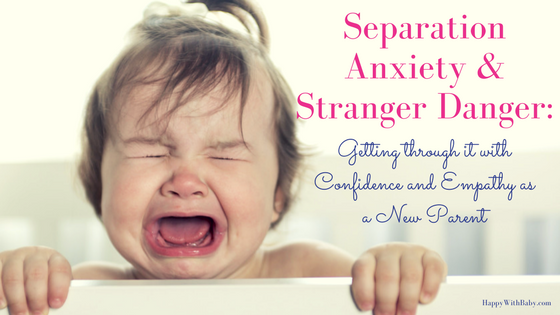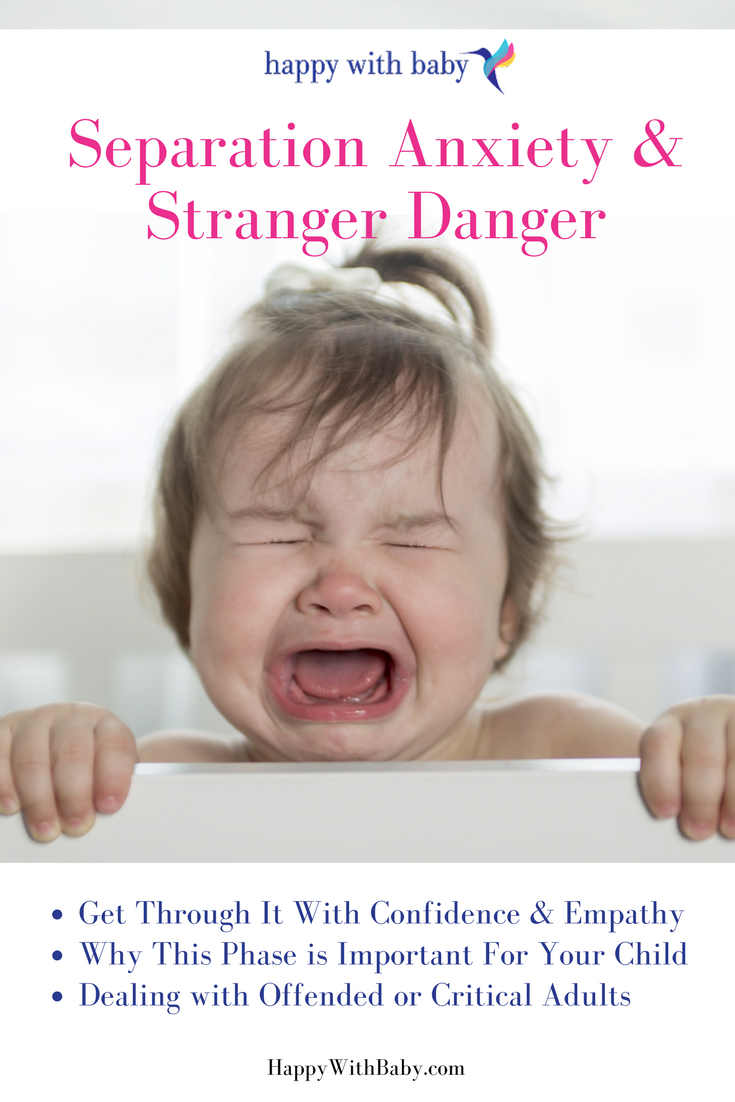Separation Anxiety & Stranger Danger: How to Get through it with Confidence & Empathy

Has your baby or toddler hit the “separation anxiety” phase in their development yet?
Our littles can start feeling separation anxiety as early as 6 months and usually phases out by age 2, but the peak age range is 8-18 months. It usually looks like clinginess, tantrums or resistance to other caregivers. It often happens when mom or dad leaves the room for a moment, or during bedtime routines, or when a child is dropped off at a caregiver’s place. What some people refer to as “stranger danger” can also coincide with separation anxiety. This is when a baby or toddler acts fearful or upset by the presence of another less familiar person in the room. Another related behavior is when your baby or child prefers one parent over the other.
This can be extra challenging for new parents to get through. It can be heartbreaking, frustrating, and embarrassing at times.

It makes goodbyes at daycare especially painful.
For moms who already struggle with confidence in getting out and about with their baby or with just continuing about their day-to-day stuff (because we all have other things we need to do besides feed and hold our babies, right?), this phase can be gut-wrenching and a real test of our fortitude.
This can also be hurtful for working parents who take it personally when they come home and the baby prefers the stay-at-home parent over them, even though they might understand that it’s only natural and a phase.
And, this can sometimes put a rift in relationships when a family member (often from older generations--our parents or in-laws in particular--takes offense to the baby not wanting to be held or finds the child’s behavior to be clear evidence that you must be coddling them too much and doesn’t mind telling you so.
Your Baby is Doing What She’s Supposed to Do
In most cases of separation anxiety, it’s a very normal and healthy phase. (If your child continues to experience separation anxiety well into their elementary school years and beyond, they may have separation anxiety disorder, but this generally isn’t something to panic about now while your little one is so small.)
You could even view this phase as a positive: It shows that your child is well-attached and that you provide a sense of safety and security to them.
It shows that your child believes that their security relies on your presence. But, it also can show that your child is beginning to claim a sense of autonomy because they are demonstrating their own opinion on the situation.
This is all healthy child development. And you can gently help them to grow their sense of trust in the world and their sense of autonomy by gradually pushing this boundary in small ways.
How to Cope as a Parent & Support Your Child
I know how hard separation anxiety is for parents, especially new parents who might be questioning their every move as it is. Here are my best tips:
-
Parenting isn’t a likeability contest. If you are not the preferred parent right now, know that it is a phase and try to find some peace with it. Know that sooner or later, it’s going to flip-flop and you’ll be the favored parent (and then it will flip-flop again, probably many times throughout your parenting adventure). Don’t try to force your baby or toddler to love you more or to sit on your lap if they don’t want to. But, DO talk to your partner about how you feel about it. I’d be willing to bet that this favoritism is hard on your partner too.
-
Find ways to ease into transitions more gently. If you’re hiring a babysitter, maybe have that sitter come one or two times just to hang out with your little one for a while with you still present before you ever intend to leave the sitter alone with your child. Or, maybe start by just leaving the baby alone with your partner or someone more familiar every now and then.
-
Do continue to prioritize your solo time, even if it’s only for an hour at a time. You need this time to recharge.
-
Be consistent. Can you book a sitter for the same day and time once a week, even if you aren’t sure what you’ll do with that time? The habit will create familiarity.
-
When dropping your child off at daycare or saying goodbye before you leave, try to keep your goodbye short and sweet. The more you drag it out, the more your baby will pick up on your hesitation to leave and see this as a sign that this situation isn’t OK.
-
Never try to sneak away when your baby appears occupied without saying goodbye. This will only exacerbate things when they realize you’re gone. It might be easier for you, but it makes things more upsetting for your baby.
-
When “stranger danger” presents itself, stay calm and upbeat. Find ways to make your little one feel safe while in the presence of someone new or unfamiliar. Hold your child while you introduce them. If they remain upset, try putting just a little more space in between your child and the other person or try to find a game that you call can interact with, but remain present. Never dismiss your child’s feelings, shame them for being afraid, or push them to respond in a way that they’re not comfortable with. You can say, “It’s ok to feel a little shy. Everybody feels shy sometimes.” Or, say “How would you like to say goodbye to our new friend? Want to give a wave, a high-five or a hug?” Most importantly, your child will learn how to behave based on how you behave. Continue to show warmth to the new people you’re introducing your child to, and try to introduce your child to new people and new experiences as much as you can.
-
Don’t worry too much about the feelings of others. This might sound insensitive and I know it can be really awkward when a friend, relative, or stranger tries to be overly friendly to your child and your child doesn’t respond well to it. But always remember that what’s most important is what your child is experiencing and the messages you’re sending to your child. It’s important that we as parents teach our kids that they can trust their sense of personal boundaries as well as the healthy boundaries that we set up for them. The other person is an adult and we shouldn’t feel too much responsibility in protecting their feelings when something more important is at stake.
-
If you have put your child in daycare or your child is staying with a sitter frequently and you notice a regression in their behavior at all--worsening clinginess or regression in potty training, for example--do take this as a sign that it is too much for your child right now or that this childcare situation isn’t right for them. Though inconvenient, see if you can find ways to change things up a bit. Perhaps it means restructuring the childcare schedule or finding a new person to care for your child. Sure, it’s a nuisance, but your child’s well-being and healthy development is worth it.
How to Smooth Tensions Over with the Grandparents
As much as I say that we shouldn’t worry about other adults’ feelings, I do realize that sometimes this can be a touchy subject for some of us. If someone in your family is taking it personally that your child doesn’t want to be held by them or left alone with them, it can sometimes cause a rift. They might think that because they are older or have already raised their kids that they have a license to tell you that you’re doing it wrong--that you’re coddling or spoiling them or that you’re not teaching them proper manners, etc.
But the reality is that every generation and every culture or subculture does things a little bit differently. Sometimes new research shows us how to do better. And when we know better, we do better. But, it's important to remind ourselves (and sometimes them too) that there's no one right way to parent. Ultimately, what it’s really about is you trusting that you as a parent are the person best qualified to determine what is best for your child.
For example, I’ve already explained how strong attachments are an important part of healthy child development and that separation anxiety is a sign that your child has developed that strong bond. You’ve probably heard the saying, “You can’t spoil an infant.” Holding them all the time isn’t coddling them. You are developing the foundations for a strong sense of security and grounding, on which all our healthy boundaries are built.
Pushing our children too much or too fast in the direction of trusting other sends the message to the child that they shouldn’t trust their own boundaries, that what they feel doesn’t matter or is wrong, and that others have more of a right over their body than your child does.
Recent research also shows us that 1 in 4 girls and 1 in 6 boys will be sexually abused before the age of 18. More often than not, this abuse comes from someone the child already knows, like a family member.
So, with that in mind, here are my suggestions for dealing with those tricky situations with an offended relative:
-
Remain confident in your choices. You’re the best person to make decisions for your child.
-
Try talking to the offended relative (preferably without your child present) and hearing them out with empathy. Tell them that you understand that they must feel hurt or disappointed that they’re not getting the bonding time with your child that they desire.
-
Assure them that their time will come, but that it has to be when your child is ready and comfortable. Explain to them as best as you can that you believe this is important for their healthy development.
-
Tell them that it is important to you that you find your own way as a parent and that unsolicited advice or criticisms don’t help. If you need advice, you will ask for it. But at this time, it is important for you to follow your intuition.
You’ve got this, moms and dads. This is a stressful phase, but you’re doing important work building a strong foundation for your child. Keep your eye on the prize and make sure you’re taking care of yourselves too.
Subscribe
Sign up to get the latest weekly blogs sent straight to your inbox


0 comments
Leave a comment
Please log in or register to post a comment